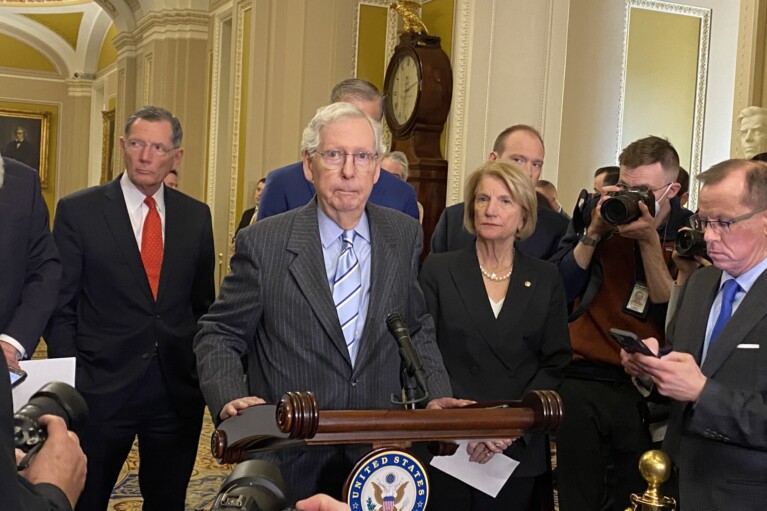These Baltimore Progressives Want Mary Washington or Jill Carter as Next Senate President

The Elephant in the Room: A New Maryland Senate President in the Near Future
When longtime Maryland Senate President Mike Miller (D-Calvert) announced his cancer diagnosis last month, it brought home the reality that the Senate will choose a new president in the not-too-distant future. So it is critically important to have a statewide discourse soon on who will be occupying one of the most influential positions in Annapolis. We believe Baltimore City Sens. Mary Washington or Jill P. Carter would be exemplary Senate presidents of the future.
Factor One: Washington and Carter have a track record of love, commitment, and care for one of the most vulnerable jurisdictions in the state, Baltimore City
Miller has always had a complicated relationship with the city. Early in his career as Senate president, he referred to Baltimore as a “f—— ghetto” and a “war zone” – dramatic language meant to illustrate the many challenges confronting one of the state’s most vulnerable jurisdictions. But it helped no one.
Rather than someone who publicly declares low expectations for our city, Baltimore needs a state Senate president who understands and will stand up for the needs of Maryland’s most vulnerable residents and communities.
Washington and Carter have deep roots in Baltimore City and track records of prioritizing the city’s most vulnerable populations – making them prime candidates to ensure Baltimore, and other struggling communities across Maryland, are not forgotten in the Maryland General Assembly.
Washington served as a state delegate from Baltimore City’s District 43 from 2011 to the beginning of 2019, before recently being elected to the Senate. Prior to public office, Washington served as the director of the Baltimore City Housing CitiStat Program, as well as the director of the Baltimore City Neighborhood Indicators Alliance.
Carter served as a delegate from 2002 through 2017 in District 41 (Baltimore City) and was also recently elected to a full term in the Senate, after being appointed to the job last summer. She is also part of a civil rights dynasty in Baltimore, as her father was the legendary Baltimore City civil rights leader, Walter P. Carter. Outside of publicly elected office, Carter also served as the Baltimore City Director of Civil Rights and Wage Enforcement.
As Senate president, either Washington or Carter would establish a renewed sense of priority for vulnerable communities like Baltimore City in the Maryland General Assembly.
Factor Two: It is way beyond time that a black woman filled the influential role of Maryland Senate president
We need to remind ourselves of the current Maryland and Baltimore City demographics in assessing a possible next Maryland Senate president. Nearly 31 percent of the Maryland population is black. Nearly 64 percent of Baltimore City residents are black. In recognizing the significant black population in Maryland and Baltimore City, we believe that it is of utmost importance to have a Maryland Senate president who demographically reflects that population and can bring a new vision to our state.
During her first term in 2002, Carter was the only black woman lawyer in the Maryland General Assembly. When elected in 2011, Washington was the first black woman LGBTQ member in the Maryland General Assembly.
Historically, the Maryland Democratic Party establishment has often favored white candidates over black candidates in key races, such as Chris Van Hollen over Donna Edwards in the 2016 U.S. Senate primary and Ben Cardin over Kweisi Mfume in the Senate primary a decade earlier. We have never had a black woman in such an influential position in Maryland. This is a shame, especially in a state that is almost as black as Mississippi.
Factor Three: Unlike many mainstream Maryland Democrats, Washington and Carter have abandoned the 90’s tough-on-crime policies and are committed to restorative criminal justice reform
Modern justice has shifted away from punitive to restorative approaches, emphasizing rehabilitation rather than punishment. Today’s research shows that punishment does not deter crime.
Maryland has fallen behind many countries and even states like North Dakota, which have restructured their criminal justice approaches to focus on rehabilitation. For four years straight, Baltimore City has experienced 300-plus homicides every year. The tough-on-crime policies of the 90s aren’t fixing crime, yet we’ve seen many mainstream Maryland Democrats, in a knee-jerk manner, re-embrace these policies as concerns over crime rises.
We need a Maryland Senate president who will abandon the 90’s tough-on-crime policies in favor of reducing recidivism by investments in community-based crime reduction, education, and pathways to employment. Unlike the current Senate president and many other elected officials within the current mainstream Maryland Democratic Party, Washington and Carter have demonstrated their commitment to restorative criminal justice reform time and time again.
In March 2018, Washington broke from the majority of her Democratic colleagues, including many Baltimore City state elected officials, when she did not vote in favor of HB 1029, a bill that included the expansion of mandatory minimum sentencing. In 2011, Washington sponsored HB 1075, a bill to end the death penalty in Maryland. She also introduced bills to legalize marijuana to fund schools and has been the leading Annapolis voice on ending home foreclosures due to delinquent water bills.
In December, Washington was the first Baltimore City elected official to come out against the funding and creation of a private police force at Johns Hopkins University. She cited the “devastating results of unchecked police power in our most vulnerable communities” and wrote that “these policies move us farther away from creating the type of City or State we want to live in, and simply furthers the ‘haves/have-nots’ racial and economic disparities that plague our current systems of education, healthcare, transportation, housing and criminal justice.”
Carter also has a track record of moving away from the era of 90’s tough-on-crime policies, and has shown a commitment to restorative criminal justice reform. Defying many of her Democratic colleagues in Baltimore City and across the state, Carter vigorously spoke out against illegal and unconstitutional police arrests, which disproportionately targeted communities of color in Baltimore City. And she opposed former Gov. Martin O’Malley (D) by fighting against the creation of a Baltimore City Juvenile Detention Center in 2012.
Furthermore, Carter led the legislative effort for “Christopher’s Law,” which mandates training with law enforcement on use and level of force, cultural diversity, and people with disabilities. Carter has almost come out against the Hopkins private police bill.
Factor Four: Both Carter and Washington have the necessary institutional experience and knowledge of the Maryland General Assembly to effectively serve as the next Senate president.
Both Carter and Washington have spent a significant amount of time on various committees in the Maryland General Assembly, developing strong in-depth institutional knowledge and experience key to success as Senate president.
Carter currently serves on the Judicial Proceedings Committee; the Joint Committee on Administrative, Executive, and Legislative Review; and the Joint Committee on Fair Practices and State Personnel Oversight. As state delegate, she served on the Judiciary Committee as the chair of the Juvenile Law Subcommittee, and as a member of the Family Law and Criminal Justice Subcommittees, as well as on several other committees.
Washington is also a member of the Judicial Proceedings Committee. As delegate, she served on various committees including the Appropriations Committee; Ways and Means Committee; and the Joint Committee on Children, Youth and Families; and was the co-chair of the Joint Committee on Ending Homelessness. From 2015-2016, Washington also served as the deputy majority whip.
Factor Five: Washington and Carter embody the revived progressive movement in the Maryland Democratic Party
The Democratic Party in Maryland has long been run by an establishment machine. But that has begun to change in Maryland, with the positioning of progressive Democrats such as Chair Maya Rockeymoore Cummings and Second Vice Chair Allison Galbraith in top positions in Maryland’s Democratic Party.
Both Washington and Carter are also part of this progressive revitalization, having taken on the establishment Democratic machine to win their most recent state Senate campaigns. Simply take a look at their mainstream Democratic colleagues who actively fought against their Senate bids.
In 2018, Carter ran a progressive, grass-roots campaign to defeat O’Malley’s son-in-law, JD Merrill in the Democratic primary. Merrill raised over $70,000 and received donations from many prominent Democrats, including O’Malley ($6,000), state Sen. Bill Ferguson ($4,000), and Del. Brooke Lierman ($100).
In the 2018 Democratic primary, Washington ousted incumbent Joan Carter Conway, who had been the state senator since 1998 and raised over $120,000. Conway received many large donations from several mainstream Democrats like Baltimore Mayor Catherine Pugh ($6,000), Sen. Bobby Zirkin ($2,000), Baltimore City Council President Jack Young ($4,000), former State Sen. Nathaniel Oaks ($3,000), former Baltimore mayor Stephanie Rawlings Blake ($2,000), former Baltimore mayor Kurt Schmoke ($500), and Van Hollen ($2,000).
Washington and Carter’s ability to take on the party establishment is rare in Maryland politics, and symbolic of the renewal of progressivism in the Maryland Democratic Party. As Senate president, either would be effective in setting a progressive legislative agenda, defending progressive values, and influencing our Maryland Democratic Party elected officials to embrace progressive ideals and legislation. Both were endorsed by unions, advocacy organizations, and community leaders; we strongly endorse these women to be leaders of Maryland’s state Senate.
— Bobby Moore, Richard DeShay Elliott and John Moser
Bobby Moore is a progressive Democrat, former Baltimore City teacher and social entrepreneur who resides near Patterson Park in Baltimore City in District 46. He can be followed on Twitter at @BaltimoreBobby3. His email is [email protected]
Richard Deshay Elliott is a Ph. D candidate at Johns Hopkins University, an electoral fellow for Progressive Maryland, the former campaign manager for Allison Berkowitz (District 7) and director of digital strategy for Allison Galbraith (Maryland’s 1st congressional district). You can find him on Twitter at @RichElliottMD.
John Moser is a political activist who runs the advocacy organization Nordic Model USA. You can find him on Twitter at @StructuralEcon.




 Creative Commons Attribution
Creative Commons Attribution